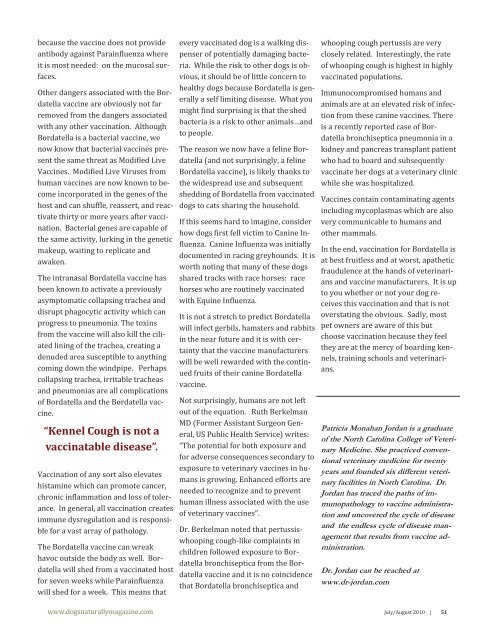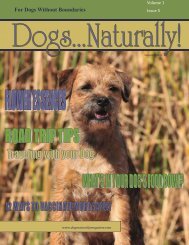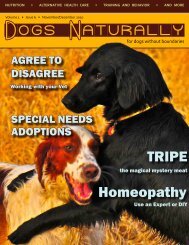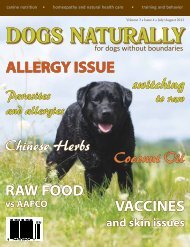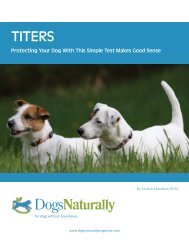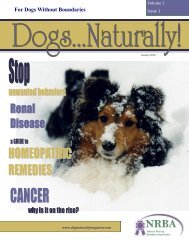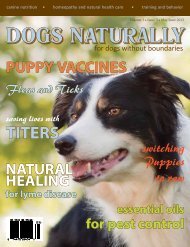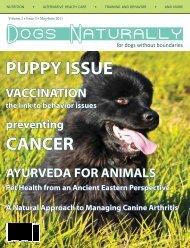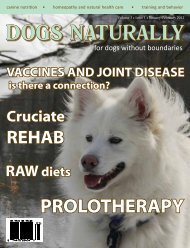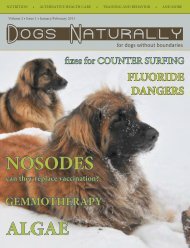July/August 2010 - Dogs Naturally Magazine
July/August 2010 - Dogs Naturally Magazine
July/August 2010 - Dogs Naturally Magazine
Create successful ePaper yourself
Turn your PDF publications into a flip-book with our unique Google optimized e-Paper software.
ecause the vaccine does not provide<br />
antibody against Parainfluenza where<br />
it is most needed: on the mucosal surfaces.<br />
Other dangers associated with the Bordatella<br />
vaccine are obviously not far<br />
removed from the dangers associated<br />
with any other vaccination. Although<br />
Bordatella is a bacterial vaccine, we<br />
now know that bacterial vaccines present<br />
the same threat as Modified Live<br />
Vaccines. Modified Live Viruses from<br />
human vaccines are now known to become<br />
incorporated in the genes of the<br />
host and can shuffle, reassert, and reactivate<br />
thirty or more years after vaccination.<br />
Bacterial genes are capable of<br />
the same activity, lurking in the genetic<br />
makeup, waiting to replicate and<br />
awaken.<br />
The intranasal Bordatella vaccine has<br />
been known to activate a previously<br />
asymptomatic collapsing trachea and<br />
disrupt phagocytic activity which can<br />
progress to pneumonia. The toxins<br />
from the vaccine will also kill the ciliated<br />
lining of the trachea, creating a<br />
denuded area susceptible to anything<br />
coming down the windpipe. Perhaps<br />
collapsing trachea, irritable tracheas<br />
and pneumonias are all complications<br />
of Bordatella and the Bordatella vaccine.<br />
“Kennel Cough is not a<br />
vaccinatable disease”.<br />
Vaccination of any sort also elevates<br />
histamine which can promote cancer,<br />
chronic inflammation and loss of tolerance.<br />
In general, all vaccination creates<br />
immune dysregulation and is responsible<br />
for a vast array of pathology.<br />
The Bordatella vaccine can wreak<br />
havoc outside the body as well. Bordatella<br />
will shed from a vaccinated host<br />
for seven weeks while Parainfluenza<br />
will shed for a week. This means that<br />
every vaccinated dog is a walking dispenser<br />
of potentially damaging bacteria.<br />
While the risk to other dogs is obvious,<br />
it should be of little concern to<br />
healthy dogs because Bordatella is generally<br />
a self limiting disease. What you<br />
might find surprising is that the shed<br />
bacteria is a risk to other animals…and<br />
to people.<br />
The reason we now have a feline Bordatella<br />
(and not surprisingly, a feline<br />
Bordatella vaccine), is likely thanks to<br />
the widespread use and subsequent<br />
shedding of Bordatella from vaccinated<br />
dogs to cats sharing the household.<br />
If this seems hard to imagine, consider<br />
how dogs first fell victim to Canine Influenza.<br />
Canine Influenza was initially<br />
documented in racing greyhounds. It is<br />
worth noting that many of these dogs<br />
shared tracks with race horses: race<br />
horses who are routinely vaccinated<br />
with Equine Influenza.<br />
It is not a stretch to predict Bordatella<br />
will infect gerbils, hamsters and rabbits<br />
in the near future and it is with certainty<br />
that the vaccine manufacturers<br />
will be well rewarded with the continued<br />
fruits of their canine Bordatella<br />
vaccine.<br />
Not surprisingly, humans are not left<br />
out of the equation. Ruth Berkelman<br />
MD (Former Assistant Surgeon General,<br />
US Public Health Service) writes:<br />
“The potential for both exposure and<br />
for adverse consequences secondary to<br />
exposure to veterinary vaccines in humans<br />
is growing. Enhanced efforts are<br />
needed to recognize and to prevent<br />
human illness associated with the use<br />
of veterinary vaccines”.<br />
Dr. Berkelman noted that pertussiswhooping<br />
cough-like complaints in<br />
children followed exposure to Bordatella<br />
bronchiseptica from the Bordatella<br />
vaccine and it is no coincidence<br />
that Bordatella bronchiseptica and<br />
whooping cough pertussis are very<br />
closely related. Interestingly, the rate<br />
of whooping cough is highest in highly<br />
vaccinated populations.<br />
Immunocompromised humans and<br />
animals are at an elevated risk of infection<br />
from these canine vaccines. There<br />
is a recently reported case of Bordatella<br />
bronchiseptica pneumonia in a<br />
kidney and pancreas transplant patient<br />
who had to board and subsequently<br />
vaccinate her dogs at a veterinary clinic<br />
while she was hospitalized.<br />
Vaccines contain contaminating agents<br />
including mycoplasmas which are also<br />
very communicable to humans and<br />
other mammals.<br />
In the end, vaccination for Bordatella is<br />
at best fruitless and at worst, apathetic<br />
fraudulence at the hands of veterinarians<br />
and vaccine manufacturers. It is up<br />
to you whether or not your dog receives<br />
this vaccination and that is not<br />
overstating the obvious. Sadly, most<br />
pet owners are aware of this but<br />
choose vaccination because they feel<br />
they are at the mercy of boarding kennels,<br />
training schools and veterinarians.<br />
Patricia Monahan Jordan is a graduate<br />
of the North Carolina College of Veterinary<br />
Medicine. She practiced conventional<br />
veterinary medicine for twenty<br />
years and founded six different veterinary<br />
facilities in North Carolina. Dr.<br />
Jordan has traced the paths of immunopathology<br />
to vaccine administration<br />
and uncovered the cycle of disease<br />
and the endless cycle of disease management<br />
that results from vaccine administration.<br />
Dr. Jordan can be reached at<br />
www.dr-jordan.com<br />
www.dogsnaturallymagazine.com <strong>July</strong>/<strong>August</strong> <strong>2010</strong> | 51


